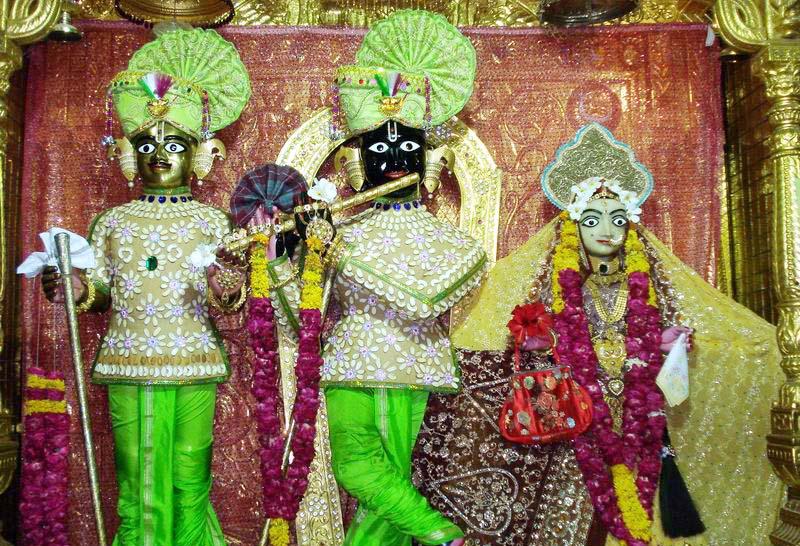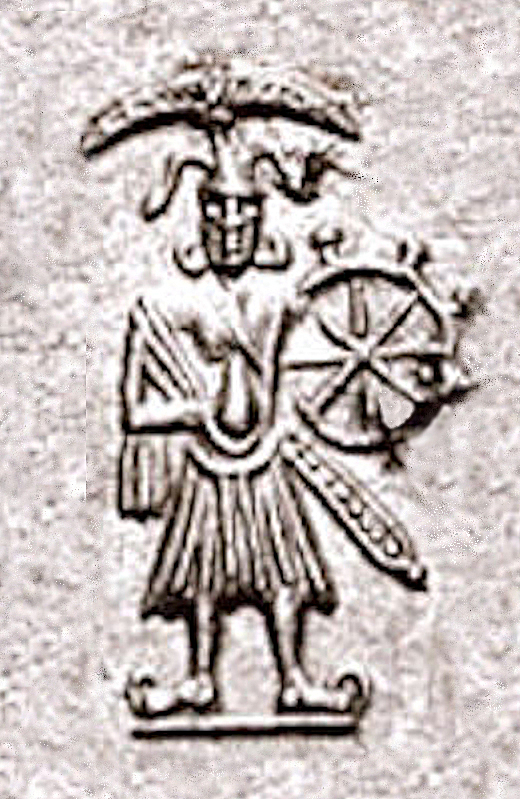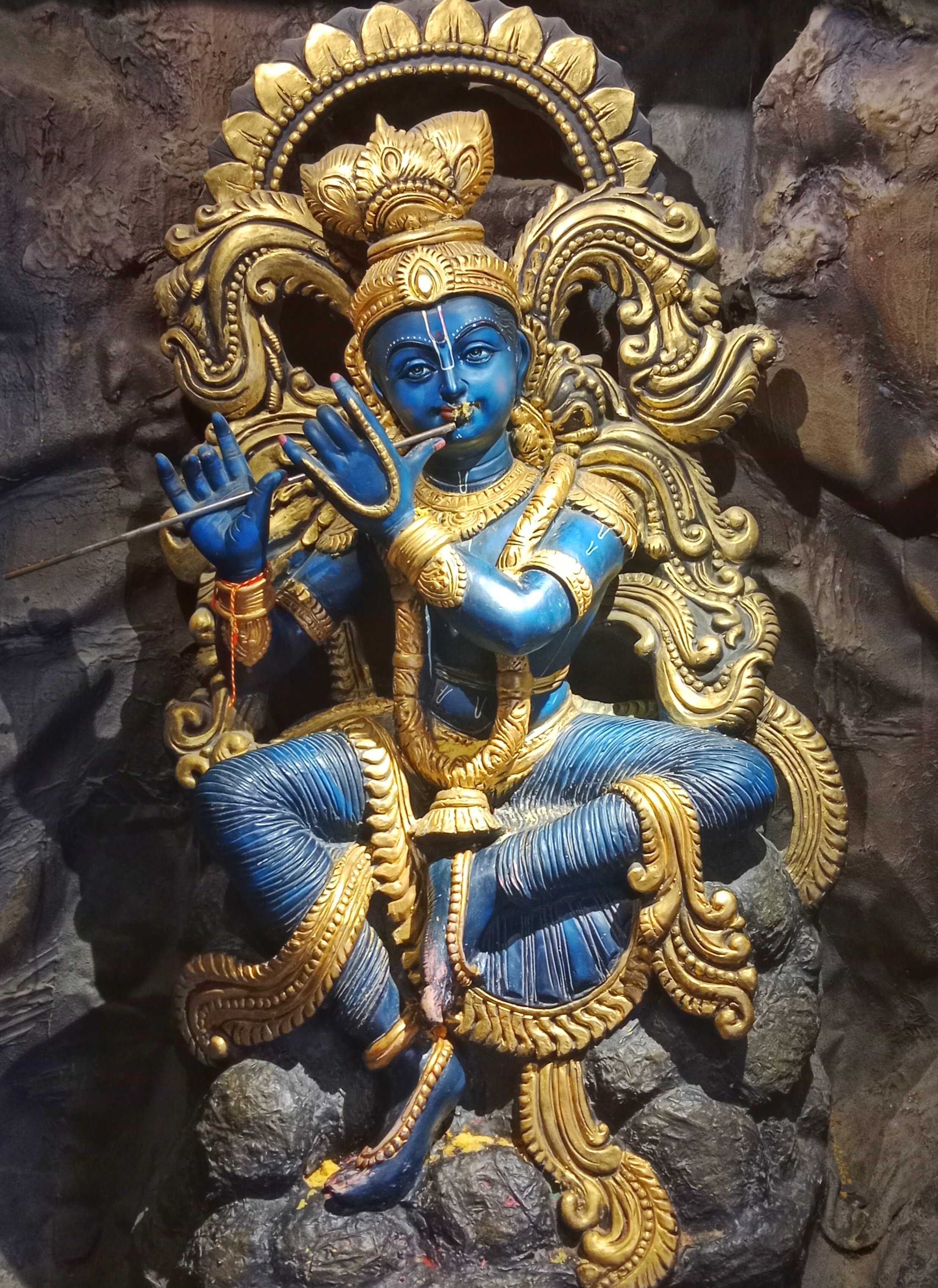|
Gopinath (Krishna)
Gopinath () or Gopinatha is a form of the Hindu god Krishna. It is also one of the primary names of Krishna, meaning, "the lord of the cowherdesses". Gopinath is associated with the gopis (milkmaids) of the Braj (Vraja) region. The gopis are regarded to symbolise selfless devotion (bhakti) to the deity, flocking around him in love and worship. The relationship between the gopis and Krishna is described in texts such as the Harivamsa, Bhagavata Purana, and the Gita Govinda. Meanings The name Gopinath is a Sanskrit compound. Generally, Gopinath is understood to be a ''tatpuruṣa'' compound meaning "Lord (or protector) of the ''gopīs''." A Gaudiya interpretation of the name is that Gopinath is a ''bahuvrīhi'' compound meaning "Krishna whose masters are the ''gopīs''." Temples In many Krishna temples, Krishna is worshipped as Gopinath. Historic temples of Gopinath includes: * Sri Sri Radha Gopinath Temple, Jaipur * Sri Sri Radha Gopinath Temple, Vrindavan * Gopinath Dev ... [...More Info...] [...Related Items...] OR: [Wikipedia] [Google] [Baidu] |
Krishna Dancing Atop A Stool, Attended By Two Gopis
Krishna (; Sanskrit language, Sanskrit: कृष्ण, ) is a major deity in Hinduism. He is worshipped as the eighth avatar of Vishnu and also as the Supreme God (Hinduism), Supreme God in his own right. He is the god of protection, compassion, tenderness, and love; and is widely revered among Hindu divinities. Krishna's birthday is celebrated every year by Hindus on Krishna Janmashtami according to the lunisolar calendar, lunisolar Hindu calendar, which falls in late August or early September of the Gregorian calendar. The anecdotes and narratives of Krishna's life are generally titled as ''Krishna Līlā''. He is a central figure in the ''Mahabharata'', the ''Bhagavata Purana'', the ''Brahma Vaivarta Purana,'' and the ''Bhagavad Gita'', and is mentioned in many Hindu philosophy, Hindu philosophical, Hindu theology, theological, and Hindu mythology, mythological texts. They portray him in various perspectives: as a god-child, a prankster, a model lover, a divine hero, ... [...More Info...] [...Related Items...] OR: [Wikipedia] [Google] [Baidu] |
Swaminarayan Mandir, Gadhada
Swaminarayan Mandir, Gadhada (Devnagari: श्री स्वामिनारायण मन्दिर, गढडा), also known as Gopinathji Dev mandir, is a Hindu temple in Gadhada, Gujarat, India. This Swaminarayan Sampradaya temple is one of the six temples built by the sect's founder Swaminarayan. The temple is dedicated to Radha Krishna. About Gopinathji Mandir This temple is one of six temples which was made under the supervision of Swaminarayan, the founder of Swaminarayan Sampradaya. The land for constructing this temple in Gadhada, was donated by the court of Dada Khachar in Gadhada. Dada Khachar and his family were devotees of Swaminarayan. The temple was made in the courtyard of his own residence. The temple work was planned and executed directly under the consultation and guidance of Swaminarayan. Swaminarayan supervised the construction and also helped with the manual service in the construction of the temple, by lifting stones and mortar. This shrine has ... [...More Info...] [...Related Items...] OR: [Wikipedia] [Google] [Baidu] |
Titles And Names Of Krishna
A title is one or more words used before or after a person's name, in certain contexts. It may signify their generation, official position, military rank, professional or academic qualification, or nobility. In some languages, titles may be inserted between the first and last name (for example, in German or clerical titles such as Cardinal in Catholic usage – Richard Cardinal Cushing). Some titles are hereditary. Types Titles include: * Honorific titles or styles of address, a phrase used to convey respect to the recipient of a communication, or to recognize an attribute such as: ** Imperial, royal and noble rank ** Academic degree ** Social title, prevalent among certain sections of society due to historic or other reasons. ** Other accomplishment, as with a title of honor * Title of authority, an identifier that specifies the office or position held by an official Titles in English-speaking areas Common titles * Mr. – All males * Ms. – Adult women * Mrs. – ... [...More Info...] [...Related Items...] OR: [Wikipedia] [Google] [Baidu] |
Forms Of Krishna
Form is the shape, visual appearance, or configuration of an object. In a wider sense, the form is the way something happens. Form may also refer to: *Form (document), a document (printed or electronic) with spaces in which to write or enter data *Form (architecture), a combination of external appearance, internal structure, and the unity of the design *Form (education), a class, set, or group of students *Form (religion), an academic term for prescriptions or norms on religious practice *Form, a shallow depression or flattened nest of grass used by a hare *Form, or rap sheet, slang for a criminal record People * Andrew Form, American film producer * Fluent Form, Australian rapper and hip hop musician Arts, entertainment, and media * Form (arts organisation), a Western Australian arts organisation * Form (visual art), a three-dimensional geometrical figure; one of the seven elements of art *Poetic form, a set of structural rules and patterns to which a poem may adhere *Musi ... [...More Info...] [...Related Items...] OR: [Wikipedia] [Google] [Baidu] |
Vāsudeva
Vāsudeva (; ), later incorporated as Vāsudeva-Krishna (, "Krishna, son of Vasudeva Anakadundubhi, Vasudeva"),"While the earliest piece of evidence do not yet use the name Krsna...." in At the time of the Heliodorus pillar dedication to Vāsudeva in 115 BCE: "The real question, however, remains: was Vãsudeva already identified with Krsna?" Krishna-Vāsudeva or simply Krishna, was the son of Vasudeva Anakadundubhi, king of the Vrishnis in the region of Mathura. He was a leading member of the legendary Vrishni heroes, and may well have been a historical ruler in the region of Mathura.Vāsudeva and Krishna "may well have been kings of this dynasty as well" in Vaishnavism, Vāsudevism arose with the decline of Vedism in India, which occurred during the 8th to 6th century BCE. Vāsudeva then became the object of one of the earliest forms of personal deity worship in India, and is attested from around the 4th century BCE. At that time, Vāsudeva was already considered as a deity, ... [...More Info...] [...Related Items...] OR: [Wikipedia] [Google] [Baidu] |
Radha Ramana
Radha Ramana () is one of the three combined forms of the Hindu deities Radha and Krishna. The other two forms are Banke Bihari and Radha-Vallabha. Radha Ramana is typically adorned with feathers, a crown, a yellow dress, and a shining '' vaijayanti-mala'' (garland) on his chest. He is regarded to wear ornaments in his ears and a shining tilaka on his forehead. Radha Ramana Temple, one of the ancient temples of Vrindavan, is dedicated to Radha Ramana. According to Gaudiya tradition, Radha Ramana was manifested by the saint Gopala Bhatta Goswami in the 16th century. Etymology Radha Ramana is an epithet of Krishna as the lover (''ramana'') of Radha. Literature The appearance of the Radha Ramana is described by Gopala Bhatta Goswami biographer, Narahari, in a mere four verses (Bhakti Ratnakara 4.315–319). Narahari Chakravarti puzzles at Krishnadasa's near silence over Gopala Bhatta. He concludes that Gopala Bhatta requested his junior, Krishnadasa Kaviraja, to be omitted from ... [...More Info...] [...Related Items...] OR: [Wikipedia] [Google] [Baidu] |
Madhava (Vishnu)
Madhava (, ) is one of the primary epithets of Vishnu and Krishna. The word ''Mādhava'' in Sanskrit is a ''vṛddhi'' derivation of the word ''Madhu'' (), which means honey. It is a title of Krishna, referring to his lineage as 'he who appeared the Madhu dynasty'. In the Bhagavad Gita, Arjuna addresses Krishna as Madhava (meaning "lord of fortune"; not to confused with a secondary name, Madhusudana, which means "slayer of the demon Madhu"). According to Adi Shankara's commentary on the ''Vishnu Sahasranama'' and the ''Narada Pancharatra'', Madhava means the consort (''dhava'') of the mother (''ma''), referring to Lakshmi, the goddess called the 'mother of the universe'. Alternatively, it means the 'one who is fit to be known through Madhu-vidya', or can mean the 'one who is the lord of ''ma'', or knowledge. Madhava is the name by which Lord Mahavishnu, MahaVishnu will reincarnate by the end of Kali Yuga, Kaliyuga to establish the righteousness as per the sanaatan scriptures like ... [...More Info...] [...Related Items...] OR: [Wikipedia] [Google] [Baidu] |
Keshava
Keshava (, ) is an epithet of Vishnu in Hindu tradition. The name appears as the 23rd and 648th names in the Vishnu sahasranama, Vishnu Sahasranama of the Mahabharata. Keshava is also venerated by those persons wanting to avert bad luck or ill-omens. His consort is Kirti (Lakshmi). Keshava is an Chaturvimshatimurti#Iconography, iconographical form of Vishnu. Etymology Keshava means "the one with beautiful long (unshorn) hair" or "killer of the Keshi (demon), Keshi demon". According to the Padma Purana, the name refers to Krishna's long, beautiful, looking unshorn hair. Referring to Sangraha Ramayana of Narayana Panditacharya, Authors Meenakshi Bharat and Madhu Grover says that "The name Keshava refers to Vishnu. The letter 'Ka' refers to Brahma and 'Isha' refers to Shiva. The word Keshava refers to one who animates both Brahma and Shiva". Literature A verse from the Vishnu Sahasranama mentions Keshava: In Bhagavad Gita, Arjuna uses the name Keshava for Krishna a numbe ... [...More Info...] [...Related Items...] OR: [Wikipedia] [Google] [Baidu] |
Govinda
Govinda (, ), also rendered Govind, Gobinda, and Gobind, is an epithet of Vishnu and his avatars, such as Krishna. The name appears as the 187th and the 539th name of Vishnu in the ''Vishnu Sahasranama''. The name is also popularly addressed to Krishna, referring to his youthful activity as a cowherd boy. Etymology Govinda can be directly translated as "protector of cows". Moreover, in the word "Govinda", "Govu" means ''Indriyas''. Govinda therefore means the all-pervading, omnipresent ruler of the sense organs, or ''Indriyas''. "Govu" also means 'Vedas'. Hence Govinda is the supreme being who can be known through the Vedas. Interpretations ''Govinda'' is a name of Krishna and also appears as the 187th and 539th name of Vishnu in the Vishnu Sahasranama, the 1,000 names of Vishnu.''Sri Vishnu Sahasranama'', commentary by Sri Sankaracharya, pgs. 69 and 115, translated by Swami Tapasyananda (Ramakrishna Math Publications, Chennai) According to Adi Shankara's commentary on ''Vish ... [...More Info...] [...Related Items...] OR: [Wikipedia] [Google] [Baidu] |
Gopala-Krishna
Gopala Krishna () refers to a form of the Hindu deity Krishna, as featured in the Harivamsha and the Puranas. The narratives of Gopala Krishna are set in the cowherd settlement of the Vraja region called Gokulam, where he is raised by his foster-parents, Nanda and Yashoda. Historically one of the earliest forms of worship in Krishnaism, it is believed to be a key element of the early history of the worship of Krishna. This tradition is considered separate from the associated traditions of Bala Krishna and Radha Krishna, that led to amalgamation under Bhagavatism at a later stage of historical development. Literature The Bhagavata Purana, as well as the Harivamsha, a text that supplements the Mahabharata, are the primary sources that describe the legend of Gopala Krishna. The tenth book of the Bhagavata Purana, called the Krishna-charita, offers details regarding the childhood of Krishna as the foster-son of Nanda and Yashoda, his life of a cowherd in Vraja, his defeat of the ... [...More Info...] [...Related Items...] OR: [Wikipedia] [Google] [Baidu] |
Achyuta
In Hinduism, Achyuta (, ) is an epithet of Vishnu and appears as the 100th and 318th names in the Vishnu Sahasranama. It is also often used in the Bhagavad Gita as a personal name of Krishna. According to Adi Shankara's commentary on the 1000 Names of Vishnu, Achyuta means "one who will never lose his inherent nature and powers". The name also means "immovable", "unchangeable", and as such is used for "the one who is without the six transformations, beginning with birth". Literature *''"Arjuna said: O infallible one (Achyuta), please draw up my chariot between the two armies so that I may see those present here desiring to fight, and know with whom I must contend in this great trial of arms."'' (Bhagavad Gita Chapter 1, verses 21-22) *Arjuna speaking: ''"Thinking of You as my friend, I have rashly addressed You "O Krishna", "O Yadava", "O my friend", not knowing Your glories. Please forgive whatever I may have done in madness or in love. I have dishonoured You many times, jes ... [...More Info...] [...Related Items...] OR: [Wikipedia] [Google] [Baidu] |
Gujarat
Gujarat () is a States of India, state along the Western India, western coast of India. Its coastline of about is the longest in the country, most of which lies on the Kathiawar peninsula. Gujarat is the List of states and union territories of India by area, fifth-largest Indian state by area, covering some ; and the List of states and union territories of India by population, ninth-most populous state, with a population of 60.4 million in 2011. It is bordered by Rajasthan to the northeast, Dadra and Nagar Haveli and Daman and Diu to the south, Maharashtra to the southeast, Madhya Pradesh to the east, and the Arabian Sea and the Pakistani province of Sindh to the west. Gujarat's capital city is Gandhinagar, while its largest city is Ahmedabad. The Gujarati people, Gujaratis are indigenous to the state and their language, Gujarati language, Gujarati, is the state's official language. The state List of Indus Valley civilisation sites#List of Indus Valley sites discovered, ... [...More Info...] [...Related Items...] OR: [Wikipedia] [Google] [Baidu] |









